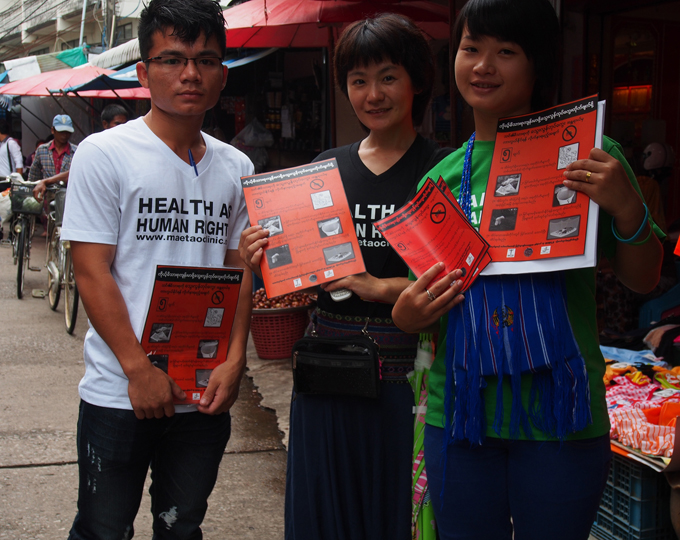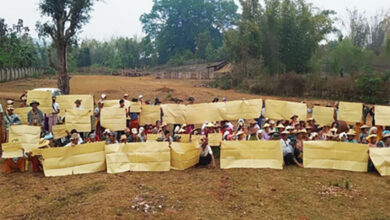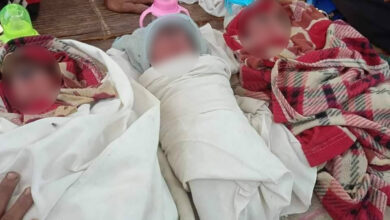Mae Sot Migrant Worker Campaign To Stop Dengue Kicks Off

Community health workers in the Thai border town of Mae Sot have developed a health education campaign under the banner of Stop Dengue – Protect Your Family! Health workers said that the aim of the campaign is to combat the spread of the mosquito borne infection among the region’s migrant workers.
Ms Aya Tabata, a project officer with the Japanese Association (JAM) for Mae Tao Clinic, the coordinators of the campaign, told Karen News that the objective is to get migrant workers to protect themselves and their families from dengue.
“This year’s campaign is to develop information materials that have been designed and written specifically for migrant workers. As there is no vaccine for dengue we have taken a health education approach by urging people to adopt good health practices that will prevent the mosquito from breeding.”
The World Health Organization has classified dengue as “the fastest growing mosquito-borne disease, with almost half the world’s population now at risk” and “one of the leading causes of serious illness and death among children.”
Ms Tabata said the Stop Dengue campaign had the support of local health workers.
“Staff from Mae Sot General Hospital, Mae Tao Clinic and Jam are concerned about dengue at this time of year and especially the risk it poses to children. It is important that we take our health messages to the community so they can take action.”
Ms Tabata said that the Stop Dengue – Protect Your Family campaign would run for two weeks during August, at the peak of the regions monsoon season. Ms Tabata told Karen News that JAM has adapted for local conditions, guidelines advocated by the World Health Organisation and used during last year’s ASEAN Dengue Day.
“We want people to help stop the spread of dengue by getting rid of standing water around their houses as this creates potential mosquito breeding sites. We are asking people to sleep under mosquito nets, wash and clean water tanks at least once a week, use insect repellant, empty water out of unused containers, cut long grass around the house and to put insecticide sand into water tanks used to store water for washing.”
The Stop Dengue – Protect Your Family! – campaign started on Sunday 3rd August with public service announcements in Burmese on local radio stations. Ms Tabata explained that as well as the radio service messages; health education information would be distributed to migrant schools, local hospitals, clinics, teahouses and markets in an attempt to reach people at risk.
“Our campaign recognizes that migrant workers have busy lives. We will work with the community and take our health message out to where they are. We have designed and condensed our message into an easy-to-understand five actions that people can do to protect their family from dengue.”
Ms Tabata pointed out that the 2014 campaign is a pilot and will help local community health workers to evaluate, develop and build on the health messages that worked with the community and find directions in which to take the campaign next year.
“Targeted community health campaigns are important. The World Health Organisation classifies dengue as a neglected tropical disease borne by mosquitoes. It has grown to the stage that almost half the world’s population is now at risk. The disease is now one of the leading causes of serious illness and death among children.”
The Bangkok Post reported in 2013 that Thailand recorded “its worst epidemic of dengue fever in 20 years with 126 deaths and 135,344 people infected” with dengue. In 2012, there were 74,250 cases and 79, recorded fatalities in Thailand.
Ms Tabata explained to Karen News that it is critically important that health workers involve the community in prevention strategies.
“Every migrant family [can get] involved and help, as the five simple activities that we are urging people to do can make a massive difference in controlling mosquitoes around their homes.”
The Japan Association for Mae Tao Clinic (JAM) is a non-government medical organization, founded in 2008 to work together with Mae Tao Clinic to provide health services to refugees, migrant schools and workers.




